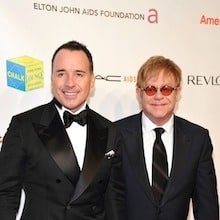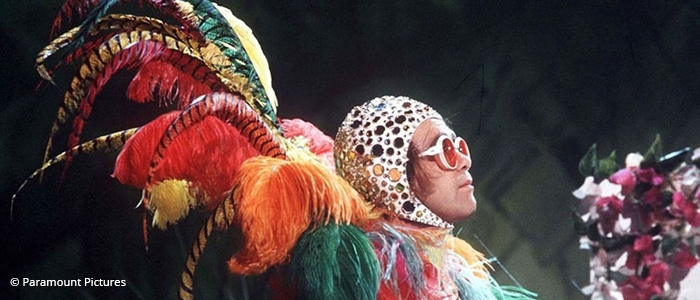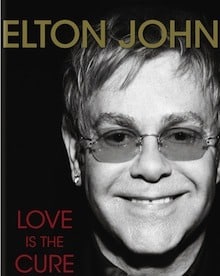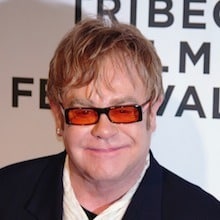In his book "Love is the Cure", pop musician Sir Elton John explains how his personal experiences with Aids have shaped his life and made him the most active. From Axel Schock
Public social engagement by celebrities is sometimes a somewhat double-edged affair. For some, charity work is nothing more than a perfect win-win situation. With minimal effort (smiling for the cameras at gala receptions), there are plus points for the image, good press and greater media attention for the organisers in return.
In quite a few cases, stars even have their appearances at charity evenings honoured in the form of generous "expense allowances". In the case of some public figures, the seriousness of their social commitment may well be questioned.
In the mid-1980s, when AIDS was rapidly developing into a barely tangible threat, Elton John joined the ranks of artists who wanted to do a good deed for those affected. John donated money generously, performed at AIDS galas and recorded a benefit single with Dionne Warwick, Stevie Wonder and Gladys Knight in aid of the American Foundation for AIDS Research.
What's more, for many years he looked after 14-year-old Ryan White in many different ways, who was banned from school because of his HIV infection and had to endure a veritable witch hunt in his home town.
"I am deeply ashamed that I didn't do more back then."
So Elton John was already doing a lot more than just marching down red carpets to cold buffets with a red ribbon on his lapel. And yet today he is self-critical: "I am deeply ashamed that I didn't do more back then." And further:
"I didn't spend enough time or effort fighting against AIDS. And supporting those who had it, even though I could easily have and should have done so." Instead, he devoted himself to cocaine, alcohol and other excesses.
Elton John's book "Love is the Cure", which is being published today in several languages, including a German translation, is initially a very honest, open-hearted and credible reckoning with his egocentric lifestyle at the time, which was characterised by many pleasures but little responsibility:
"I had everything in the world - wealth, fame, everything - but I threw a tantrum if I didn't like the curtains in my hotel room. I had completely lost my grip. It was just embarrassing."
Hollywood-worthy sentimentality
Not the death of his musician friend Freddie Mercuy, not the engagement of his friends Elizabeth Taylor and Princess Diana - it was the encounter with the student from Kokomo, Indiana, who was suffering from AIDS, that was the decisive moment for Elton John. At least that's how John describes it, and despite all the Hollywood-appropriate sentimentality, you can still believe him.
John found out about the boy's fate in his doctor's waiting room. (Yes, even pop stars read the magazines there.) Ryan had been infected with the virus through a blood product contaminated with HIV. When this became known, he was no longer allowed to attend school. And his family suffered harassment and humiliation that is almost unimaginable today. But the family went public, went to court several times - and were attacked even worse.
John made contact with the family, befriended Ryan and stood by him until his death on 8 April 1990. Four months later, the US Congress passed the Ryan White Comprehensive AIDS Resources Emergency Act (CARE) in Ryan's honour, which is still in force today and is still used to fund treatment for uninsured and low-income people with HIV and AIDS.
"I'm only here thanks to Ryan. He inspired me to get my life in order and set up my AIDS foundation."
The intensive encounters with Ryan contributed significantly to a change in awareness, writes John. He no longer wanted to follow the catastrophe as an "uninvolved onlooker". All he wanted to do was lend his name to a good cause or play a few songs on stage from time to time. "I wanted to contribute my ideas and energy, and I wanted to sacrifice my time."
In 1990, he went to a drug clinic, after which he left the music business for a year and volunteered with the "Open Hand" project in Atlanta. The project provides AIDS patients with hot meals at home. In 1992, he finally set up his own foundation, the Elton John AIDS Foundation (EJAF). It has since become one of the leading charitable AIDS organisations in the world.
To date, around 275 million US dollars have been raised to support hundreds of aid and prevention programmes worldwide.
Elton John knows the value of his name and celebrity status at the vanity fair. He uses it for his foundation and now also for this book. It could be dismissed as part of a self-presentation - the egocentric pop star purified into a self-sacrificing benefactor. But the concept behind it seems far more well thought out.
Handy and easy to understand
Elton John talks about various aid projects from Haiti to Thailand and Ukraine and the encounters he has had there as part of his foundation activities.
By analysing the particular problems on the basis of individual fates, he addresses the current problems in the fight against AIDS in a concise and understandable way, backed up with plenty of facts. From the ban on syringe exchange, criminalisation and stigmatisation to the pricing policy of the pharmaceutical industry and the growing homophobia in many countries.
In these 200 pages, "Love is the Cure" also draws a wide historical arc from the failures of the US health authorities under the presidency of George Bush to the present day. It asks some important questions! How is it possible, for example, that only around 14 per cent of the US population is African-American, yet they account for 44 per cent of new infections?
Saving lives and earning money at the same time
For John, the manufacturers of generic drugs are the silent heroes in this battle. He is by no means calling for for-profit companies to become charitable organisations. "If they can save lives and make money in the process, so much the better," John writes. "But if they deliberately choose to make even more money at the expense of people, then they should be ashamed of themselves."

Thanks to Elton John's celebrity status and his very personal approach to the subject, people might actually pick up his book who would otherwise hardly have been interested in the acute problems and debates surrounding AIDS.
And perhaps his equally personal and combative writing will also serve as an educational handout for people from politics, business and the pharmaceutical industry at the next gala dinner. It would certainly be fitting.
Elton John's easy-to-read, but always very fact-filled, all-round attack culminates in a simple, hopeful thesis. Even without further scientific research successes, the spread of the disease could be contained - through condoms, prevention, health education and needle exchange programmes.
"As long as AIDS remains a taboo subject, the epidemic will continue to spread."
And by making the necessary treatment available to all affected people. An additional 5 to 7 billion a year from now until 2020 is needed for this, Elton John calculates. Just a fraction of what US citizens spent on vitamins last year or what the big Wall Street banks paid out in bonuses to their managers.
The Pope's hostility towards condoms, the homophobia in the minds of Ugandan and Ukrainian politicians, the prejudices and fears in the minds of many people. All of this can only be combated through constant dialogue.
"If we are not afraid to look reality in the eye, our knowledge and thus our compassion will grow. These are the tools that can defeat AIDS."
"Victory over AIDS requires love, and lots of it."
Writes Elton John and then delivers a piece of calendar wisdom at the end. It sounds a bit like it could soon become a verse line in a pop ballad. But you can't necessarily expect a music star to come up with a quick solution to one of the biggest global problems. Even if he is the founder of an AIDS foundation.
If he is able to increase donations with his book and, not least, raise political awareness of the current problems in the fight against Aids, John would have already achieved a great deal. More than his colleagues who are content to walk down red carpets in evening gowns.
Elton John: " Love is the Cure. About life, about loss and how we can beat Aids". Translated from the English by Heike Schlatter and Henning Dedekind. Hoffmann and Campe, hardback, 224 pages, 19.99 euros
Link to the Elton John Aids Foundation












